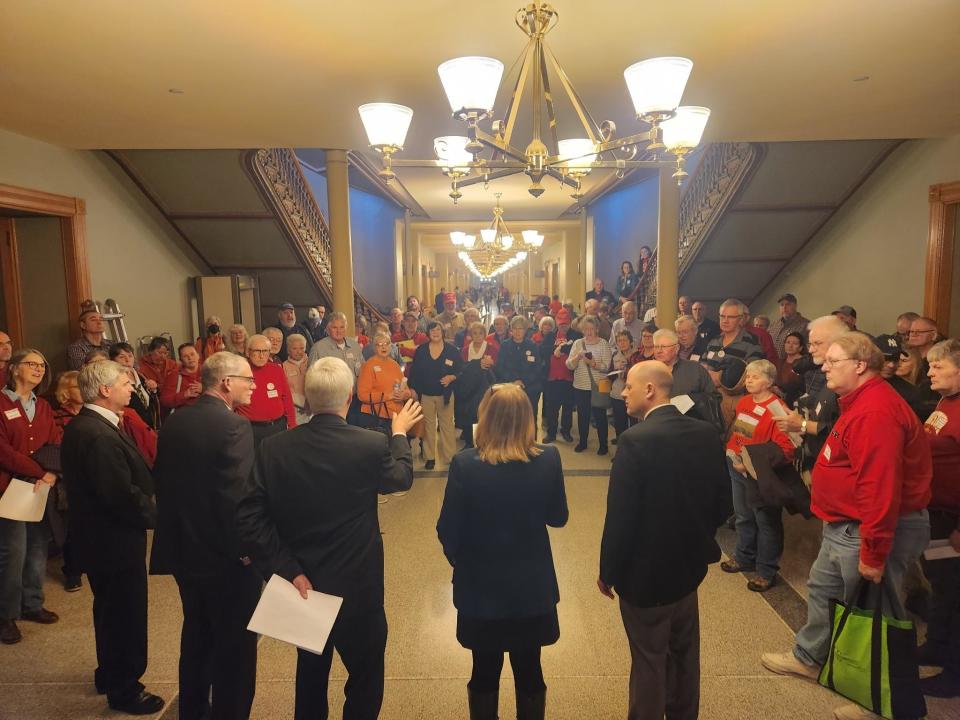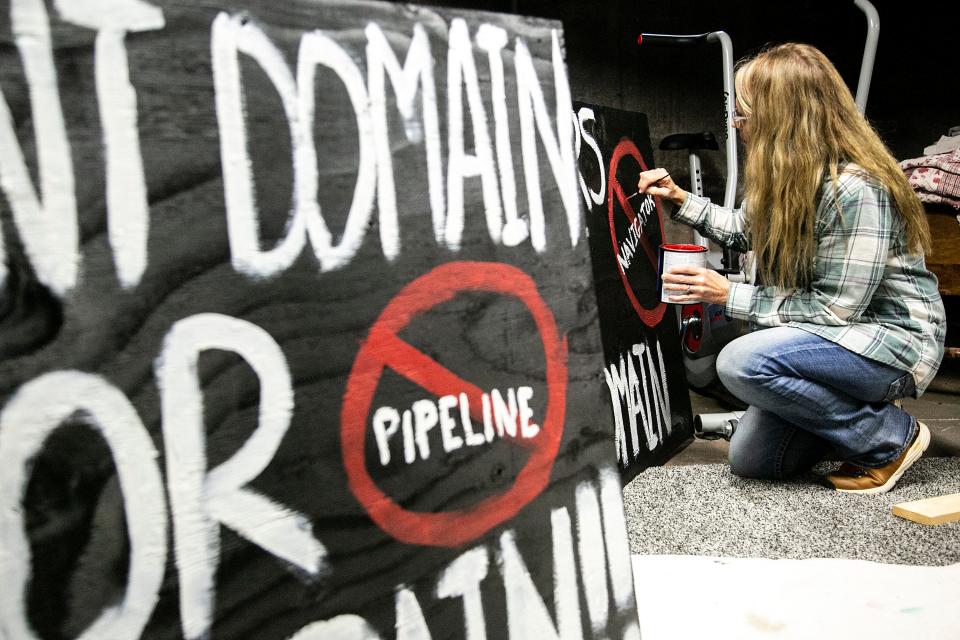Lawmakers look to curb eminent domain powers for carbon capture pipeline builders
- Oops!Something went wrong.Please try again later.
- Oops!Something went wrong.Please try again later.
Nearly two dozen eastern Iowa farmers gathered at a Shell Rock church for the two-hour trip to Des Moines with a plan to tell as many lawmakers as possible they want them to stop three companies from using eminent domain to build carbon capture pipelines across the state.
They weren't alone. As though summoned like a rural church's call tree, about 70 farmers from across the state gathered at Iowa's Capitol Jan. 24 to rally around efforts by Sen. Jeff Taylor, a Sioux Center Republican, to strip state regulators of their ability to grant eminent domain powers for hazardous liquid pipelines and make carbon capture projects in Iowa significantly harder to build.
Taylor, who's introduced five landowner protection bills, said he and other lawmakers have heard an avalanche of "complaints and concerns" from Iowa farmers, landowners and other residents, especially about eminent domain. "They don't like it and they don't think it's fair," said Taylor, who unsuccessfully tried to limit eminent domain powers last year as well. "There is a big grassroots movement that's sprung up."
Farmers at the statehouse know getting changes will be tough.

"These are powerful companies that can earn billions of dollars" with the projects, "so it's a huge undertaking to stop them," said Ted Junker, who along with Jeff Reints, Andrew Johnson and other farmers and landowners have vowed to keep pressure on lawmakers to place restrictions on the pipelines.
The concerns resonated with House Speaker Pat Grassley, a New Hartford Republican, who met with the farmers. Grassley is “following this issue very closely and is prepared to act to make sure landowner rights are being respected,” his spokesperson, Melissa Deatsch, said in an email Friday.
Grassley is working with other lawmakers to "determine what that policy should look like," Deatsch said, adding that she expects a bill to be introduced soon.
Eminent domain a flashpoint in rural Iowa
Summit Carbon Solutions, Navigator CO2 Ventures and Wolf Carbon Solutions have proposed building pipelines across Iowa and neighboring states. They would transport liquefied carbon dioxide emissions from ethanol and fertilizer plants and other industrial facilities to deep underground sequestration sites in North Dakota and Illinois.
If the companies can show a public need for the pipelines, the Iowa Utilities Board could grant them the power to force unwilling landowners to sell access to their property for the projects. Summit and Navigator have filed petitions seeking permits to build the pipelines, but regulators haven't held public hearings on the permit requests yet.
More:Builders vow CO2 pipelines will be safe. Worried Iowans point to a Mississippi rupture.
Concerns that companies could get eminent domain powers, however, have prompted hundreds of Iowans to file objections with the Iowa Utilities Board. Opponents also have cited concerns about the pipelines' safety and the impact their construction could have on field drainage systems, soil and crop yields.
The companies say the projects are necessary to ensure ethanol remains viable in California and other states that are tightening their carbon emissions standards for fuel. Iowa is the nation's largest ethanol producer, with half the state's corn crop ― also the nation's largest ― going to its production.
Additionally, large energy users like fertilizer and concrete companies face pressure to cut their carbon footprint as the Biden administration pushes the nation to reach net-zero emissions across by 2050. The administration says carbon capture and sequestration projects are part of that solution and has provided lucrative tax credits to help with the effort.

In addition to killing eminent domain for carbon capture, Taylor proposes requiring companies to get voluntary easements along 90% of the pipelines' proposed pathways before seeking eminent domain; disclosing information about the projects' investors; and restrictions on how often companies could contact landowners to gain easements as well as survey their land.
More:What we know about three carbon capture pipelines proposed in Iowa
Rep. Bobby Kaufmann, a Wilton Republican, said if pipeline developers find willing landowners to sell them easements, "build away."
"But if you’re going to try to take it, (it's) not going to happen under my watch," said Kaufmann, who also is weighing the 90% voluntary easement threshold. It's a priority for the Iowa Farm Bureau Federation, he said.
Landowners who are unwilling to sell developers access to their property should be protected, he said.
"Consensual commerce? Not my business. Government overruling somebody’s private property rights? My business. And that’s the line I’m going to draw," said Kaufmann, adding he wants to wants to address safety concerns and soil restoration after construction, among other issues.
Farmers see alternatives to carbon capture for lowering CO2 emissions
Farmers lobbying at the Capitol told Kaufmann, Taylor, Grassley and other lawmakers that growers can lower the carbon emissions tied to corn production through conservation practices like no-till — not turning over the soil, which releases carbon dioxide — using cover crops that sequester carbon and planting prairie on marginal farmland.
"We have better ways to lower the carbon score than destroying thousands of farmland" acres, said Reints, who farms near Shell Rock.
Wolf Carbon Solutions' Patrick Brierley said in an email that the Denver, Colorado, company has "never exercised eminent domain in their collective careers over decades of developing and constructing projects" and will engage "transparently and thoughtfully" with Iowa landowners and community members.
Summit's Jesse Harris said in an email that the Ames company has reached voluntary easement agreements with about 65% of Iowa landowners in its pipeline's path.
"These landowners are embracing the company’s investment because they know it’s critical to maintaining the long-term viability of the ethanol industry and a strong, vibrant ag economy," Harris said.
Navigator's Andy Bates said Iowa "has one of the most robust, thorough processes already in place that guides the development of pipeline infrastructure, and we don’t see changes needed to that process." He added that Omaha, Nebraska-based Navigator is negotiating "in good-faith to secure as much of the project footprint" voluntarily as possible.
Both Summit and Navigator have sued the Story County supervisors after they adopted an ordinance requiring increased distances between pipelines and homes, churches and schools. Summit filed a similar lawsuit against Shelby County in western Iowa that also adopted similar protections.
The companies say the ordinances attempt to preempt state and federal oversight.
Donnelle Eller covers agriculture, the environment and energy for the Register. Reach her at deller@registermedia.com or 515-284-8457.
This article originally appeared on Des Moines Register: Iowa farmers to lawmakers: Block eminent domain for C02 pipelines

